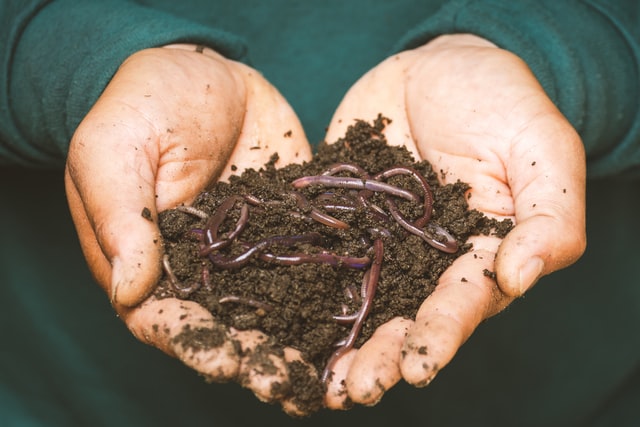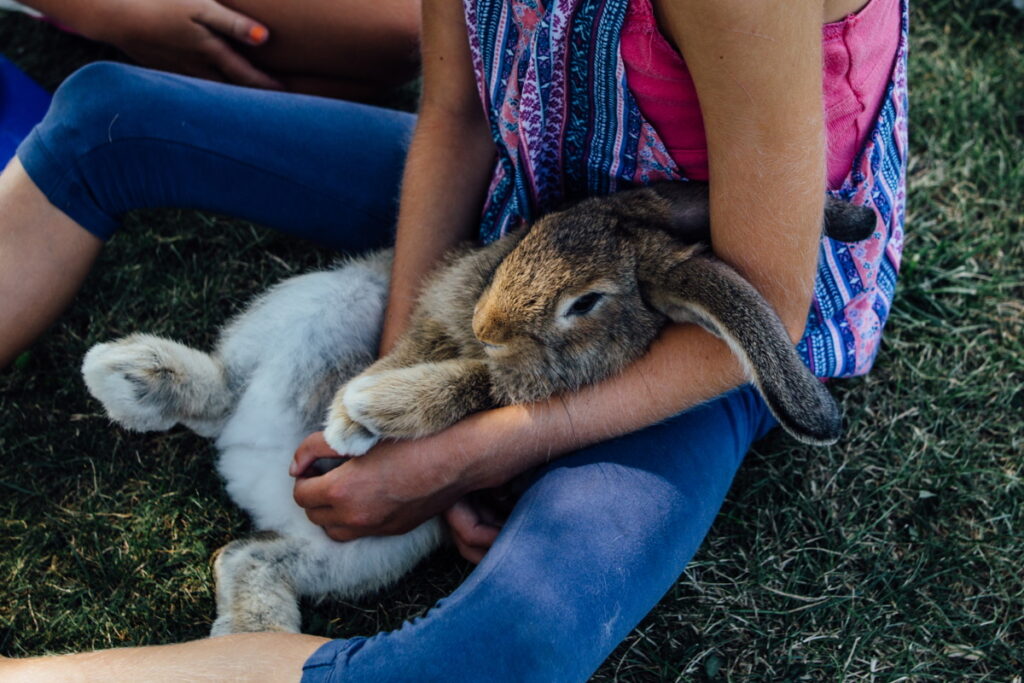Rabbits make great pets. They’re cute, social, and fun but also produce feces you need to get rid of. Unlike dog and cat poop, rabbit poop can benefit your compost and plants. Can you compost rabbit poop? Yes, and as long as you don’t add too much, it can be very beneficial. It’s rich in nutrients and helps your garden.
Composting is a great way to dispose of organic material. It keeps waste out of landfills, reduces your carbon footprint, and creates an amazing way to plant healthier plants. Your garden will thank you.
Unlike feces from other animals, rabbit poop is largely odorless, dry, and packaged in a convenient pellet form (thanks, bunnies!)
This article will discuss the benefits of composting rabbit poop, how to do it, and a few things to be cautious of.

The Benefits of Adding Rabbit Poop to Compost – Very Nutritious for Your Garden
Interestingly, rabbit poop is surprisingly good for your compost because of its makeup.
Rich in Nitrogen
Like other forms of manure, it’s rich in nitrogen. Unlike meat-eating animals, our long-eared vegetarian friends don’t run the same risks of contaminating our edible crops that meat-eating animals do (like dogs and cats).
Phosphorous
Rabbit droppings are rich in phosphorous, a great macronutrient for your plants.
Phosphorous helps your plants. It supports the transfer of energy into your plants. It supports
- Ensuring strong root development
- Reproduction of Cells
- Healthy and strong cell walls
- Flower and fruit production
- Seed Production
Phosphorous is important in plant health, and rabbit poop is a great source of it.
Potassium – Drought and Disease resistance
Rabbit poop is rich in potassium, which helps with disease resistance, root health, and the growth of your plants. This helps them resist diseases and better withstand drought conditions and various diseases. Amazingly, rabbit poop has about the same amount of potassium as you’ll find in sheep and horse manure and even more than cow manure.
Other Nutrients
Rabbit poop contains smaller amounts of other key nutrients such as boron, calcium, cobalt, copper, magnesium, manganese, sulfur, and zinc. (Wow, that’s quite a list – who knew?) It’s quite a feast of nutrients for your garden.
In addition to the nutrients, rabbit poop doesn’t smell like other manures and can be added to your compost or directly to the soil as a fertilizer.
It’s great for your plants to compost rabbit poop and, unlike other things, doesn’t have a lot of downsides. Rabbit poop is one of the better manures that you will find.
To give you an idea of how rich it is in key nutrients, let’s take a look at how it compares to other manures. Fertilizers are labeled based on their NPK values. These are the percentages of nitrogen, phosphorous, and potassium that the fertilizer contains. (K is the chemical symbol for potassium.) While fertilizer values aren’t exactly the same as what you will see from composting, the raw ingredients are still there, and it gives you an idea of how rabbit poop stands up with regards to nutrients when it’s compared to other manures.
Comparison of NPK Values of Different Manure Types
Animal | % Nitrogen | % Phosphorous | % Potassium |
Cattle | 0.5 to 1.5 | 0.2 to 0.7 | 0.5 to 2 |
Cattle (Dairy) | 0.5 to 2 | 0.3 to 0.5 | 0.4 to 1.5 |
Duck | 2.6 | 0.8 to 1.4 | 0 |
Goat | 4 | 0.6 | 1 to 2.8 |
Goose | 3.3 | 0.4 | 0.6 |
Horse | 0.7 to 1.5 | 0.2 to 0.7 | 0.6 to 0.8 |
Pig | 0.4 to 2 | 0.5 to 1 | 0.4 to 1.2 |
Pigeon | 6.3 to 6.5 | 2.5 | 2.5 |
Poultry (50% water) | 1.5 to 2 | 1.8 to 2 | 1 |
Rabbit | 3 to 4.8 | 1.5 to 2.8 | 1 to 1.3 |
Sheep | 2.2 to 3.6 | 0.3 to 0.6 | 0.7 to 1.7 |
Turkey | 5 | 0.5 | 0.6 to 0.9 |
Source: NITROGEN-PHOSPHORUS-POTASSIUM VALUES OF ORGANIC FERTILIZERS Oregon State University, 2003
How to Easily Compost Rabbit Poop
When you collect your rabbit’s droppings, you want to avoid using them if they have many plant seeds. While not horrible, these can sprout into plants in your compost. They’re usually pretty easy to get rid of (and then compost like weeds), but they can become unwelcome visitors in your garden or flower bed when you add the compost. Best to avoid it if you can.
You can compost rabbit poop as is (thankfully). You want to add an equivalent amount of leaves, wood shavings, or other brown material. They help to maintain the brown to green balance. You may also need to add some water to your compost. The browns and the rabbit feces may absorb water in the compost, drying it out. Your compost should be moist but not wet.
How Long Does Rabbit Poop Take to Compost
Rabbit poop will take anywhere from a few months to as long as a year to compost. The good news is that since it can be safely added directly to a garden if it’s not fully composted by the time you want to add the compost to your garden, that should be okay.

Composting Rabbit Poop with Worms
Worms love rabbit droppings and will happily help you compost rabbit poop. You are more than safe to add rabbit feces to your worm compost.
Like anything else new, it’s a good idea to initially add in a small amount to ensure there are no problems. Once you’ve shown that your worms are happy with it, add it in moderation and mix it with the rest of your compost.
A Few Things to Be Cautious Of
Moderation is Key
You want to avoid adding too much rabbit poop to your compost pile. The exact amount varies by the makeup and size of your compost pile. When mixed with other greens and browns, it normally does pretty well. If you add too much rabbit poop to a pile, it may take a while to break down. Keep an eye on your pile and if the rabbit droppings aren’t decomposing, hold off on adding more.
Handle Rabbit Feces Carefully
Rabbits can carry several parasites. They can have things like roundworm, tapeworm, or some zoonotic diseases that can make you sick.
You may want to wear rubber gloves while handling it and wash your hands afterward, just to be safe.
Can You Add Rabbit Poop to Compost?
Rabbit poop is a great addition to compost. It has a lot of benefits and none of the risks associated with feces from meat-eating animals like dogs and cats (or humans). The best part is that it doesn’t smell and is neatly packaged.
Make sure to mix it with browns, and handle it carefully.
Frequently Asked Questions For Compost Rabbit Poop
Can You Compost Rabbit Urine?
Just like other forms of urine, you can compost rabbit urine. It has a lot of nitrogen and is good for compost. However, you need to offset it with brown material. Too much nitrogen can be damaging to your plants (too much of a good thing and all that). So, if you are adding a lot of rabbit urine, add leaves, paper, cardboard, or some other brown material.
Is Rabbit Poop Safe for Gardens?
Yes, you can add rabbit poop compost (or even just rabbit poop directly) to your garden. It is unlikely to burn the roots of your plants because of how quickly it decomposes.
Unlike manure from meat eaters, this vegetarian dropping is safe for your plants.
Can Rabbit Litter be Composted?
Yes. Hay or straw bedding, wood chips or other natural bedding can all be composted. Wood shavings will take a bit longer to compost than paper based or straw bedding. Even straw will take some time, so that may have an impact on what you use for your rabbit’s bedding.
